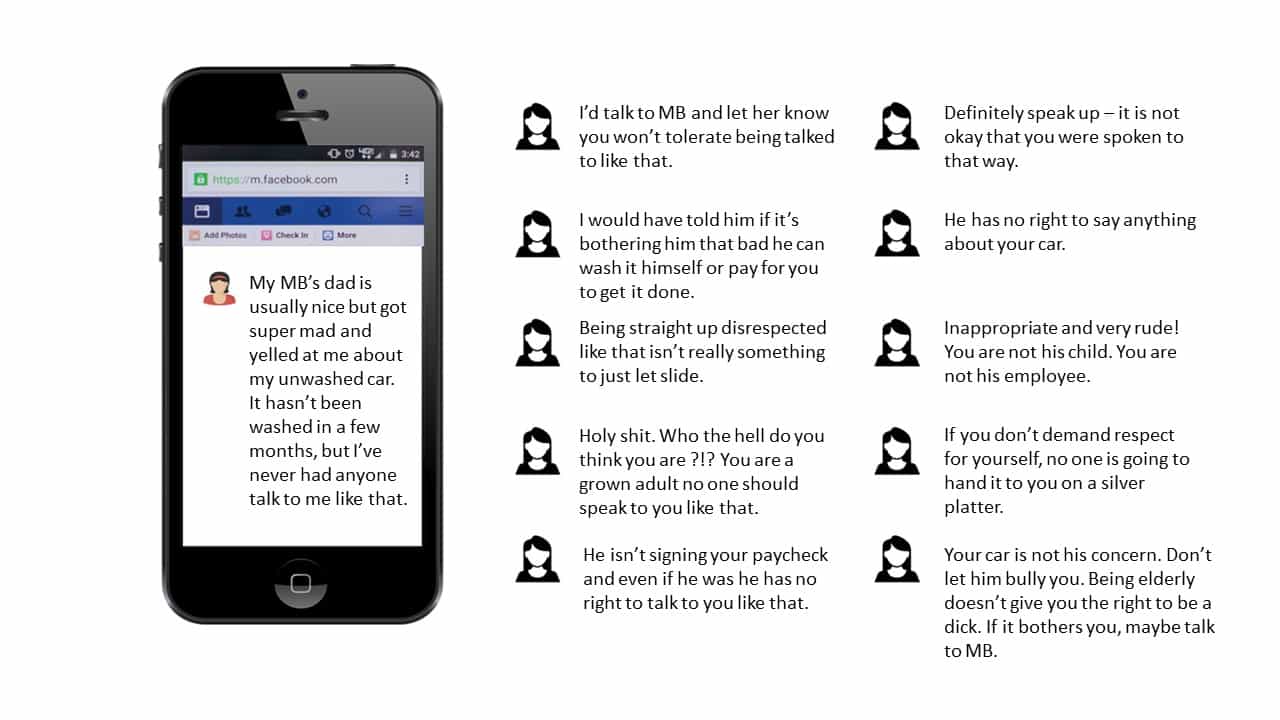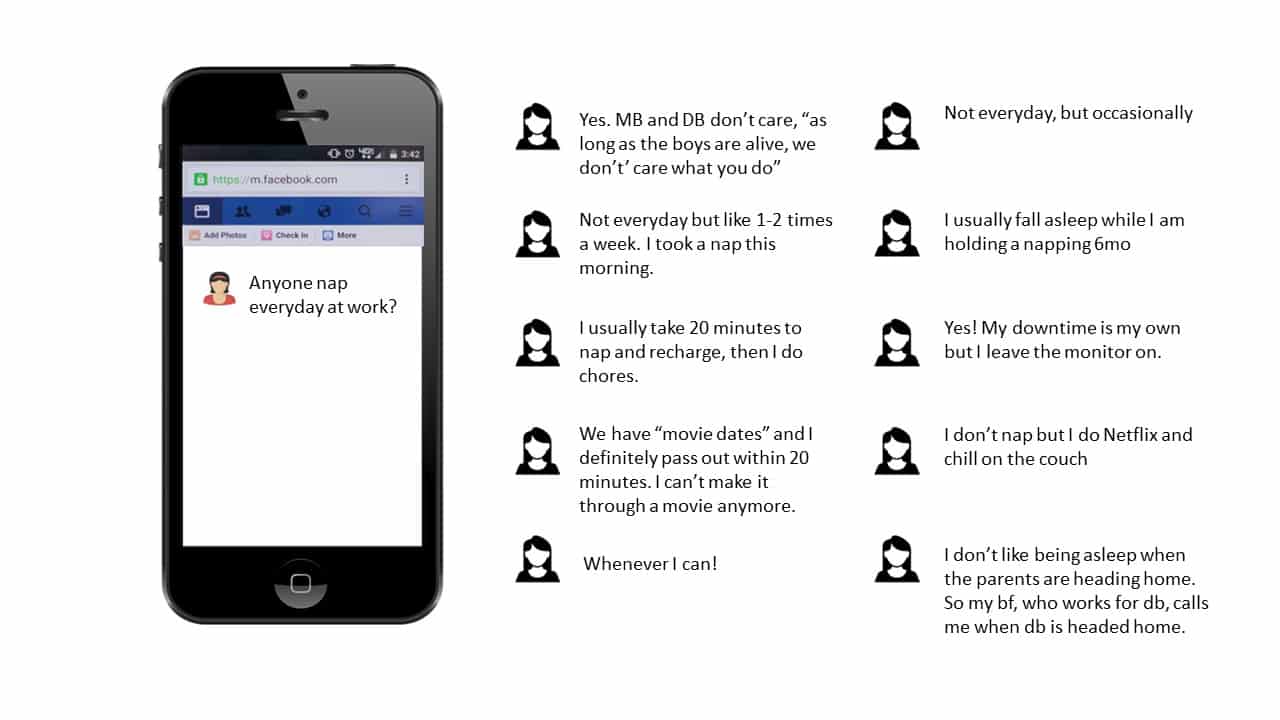Social media is a great place for conversations and a good resource for information about being a Nanny or Sitter. But be careful, social media isn’t private and can impact your professional reputation. Engaging online is convenient and a lot of wonderful Nannies share information, advice, and recommendations. They ask for input on a wide range of things – often interactions with their nanny family (NF) and they get advice from nannies with similar experiences. However, not everything on social media is useful and some Nanny advice is just plain bad.
First, it’s important to realize that ‘private’ social groups with thousands of people aren’t ‘private’. If the group has 1 person that you don’t know, then you should treat it as a public group as anyone who is a member can take screenshots and share the post. Second, social media comments are, by nature, based on limited information. Gaining insights from others’ experiences can be helpful but must be weighted with your personal experience and knowledge of the situation. Sometimes a post has too much or too little information to really understand the topic or issue.
It’s common to see post responses that focus on being treated with respect. Whether it’s a rude comment or a miscommunication, it’s easy to feel disrespected. Although you may be angry, frustrated or hurt, it’s important to remember that all jobs require employees to manage their emotions and difficult situations. Whether working as a cashier when a rude customer yells at you about an expired coupon or hearing a rude comment as a waitress, all employees, including nannies, encounter and must respond professionally and appropriately to inconsiderate behavior.
Demanding respect and telling parents that you won’t tolerate being treated disrespectfully are common responses to complex situations. These are often emotional responses. After all, you can’t demand respect. But, when you respect yourself and respect others, people will often show you respect. In this way, you can enhance your ability to influence others and how they treat you. If the incident has happened only once, then it may be best to let it go. If the issue is persistent or in any way dangerous, then it needs to be addressed.
Example #1
This article examines two actual social media conversations and their most popular responses. The posts have been re-created to protect the privacy of the participants, but the comments are genuine. For this article, only the comments that centered around the questionable advice are included. The posts had other responses that are not included here.

In the first situation, a nanny has a great relationship with the NF and once a month, the grandparents visit. She also has a great relationship with the grandparents. One day mom boss’s (MB) dad “got super mad and yelled at her about her unwashed car”. Granted, the car hadn’t been washed in months, but the grandfather was usually so nice, the nanny was taken aback and very upset about how he spoke to her. She asked Facebook how she should handle the situation.
This nanny is demonstrating emotional maturity because she’s being intentional about her response to the situation. She is looking at the situation as rationally as possible and trying to determine her best course of action. As children, we are taught to stand up for ourselves and that everyone should be nice and treat each other with respect. As adults, we learn that people can be inconsiderate and rude, and we can’t lash out every time we encounter a slight. We must ‘pick our battles’ and sometimes, even when it’s not our fault, it’s better to just let it go. All employment relationships require some give and take.
The advice to report the situation to MB comes with some risk as it puts the Mom in the middle of a conflict between the nanny and her father. This can strain the working relationship between the nanny and NF. Every situation is different, and each nanny must decide what is worth escalating into a formal discussion. If the nanny in this situation chooses to address the issue, it may be best to speak directly with the grandfather. In this real-life example, the nanny decided to let it go. In a follow-up conversation, the nanny learned the grandfather was trying to be helpful and didn’t realize he came off aggressive.
Although the communication itself may have been rude, the grandfather may have a point about washing the car. As one nanny wrote, “If your car looks like a rolling mud bucket, it’s probably time for a wash. Showing up at your family’s house looking like you’ve been mud bogging doesn’t look very professional. I do feel like if I want to be treated and viewed as a professional, I have to conduct myself in a professional way. So, I try every weekend to get my car vacuumed out and all the trash out too. It helps project a professional image, especially because past nanny families I have worked for live in posh areas. Image can matter to the NF. Most people in my nanny family neighborhood drive BMW, Escalades and other high-end cars.”
Example #2
Now let’s look at another conversation. A nanny posted the question: “Anyone nap everyday at work?” This is an example of a posting with limited information. It’s impossible to tell if the objective was to get information about napping while the children are present, napping while the children nap, or napping while the children are with someone else. There were over 100 comments to this thread and since it asked if you napped, most replied that they did. While some families are aware and approved a nap, others were not. Several nannies commented they wanted to take a nap but couldn’t nap due to the age of the children or having to work.

When you earn money by providing a service, it’s good advice to stay awake on the job, especially when caring for children. While every employer is different, and some overnight jobs include time for sleep, most families expect nannies to be awake and committed to executing their job duties.
Every nanny job is unique and it’s up to the nanny and family to communicate clearly and effectively to work well together. When seeking advice, social media can provide a lot of great information but be cautious of blindly taking social media advice. Only you can make the right decisions for your situation and goals.
—
The Nanny Institute provides online childcare classes and certification programs based on a curriculum specifically designed to advance the skills of Nannies and Sitters. The Nanny Institute has over 30 college faculty with a passion for education and childcare, bringing them together to help childcare providers gain practical skills and qualifications that benefit their careers and the children in their care.

Recent Comments